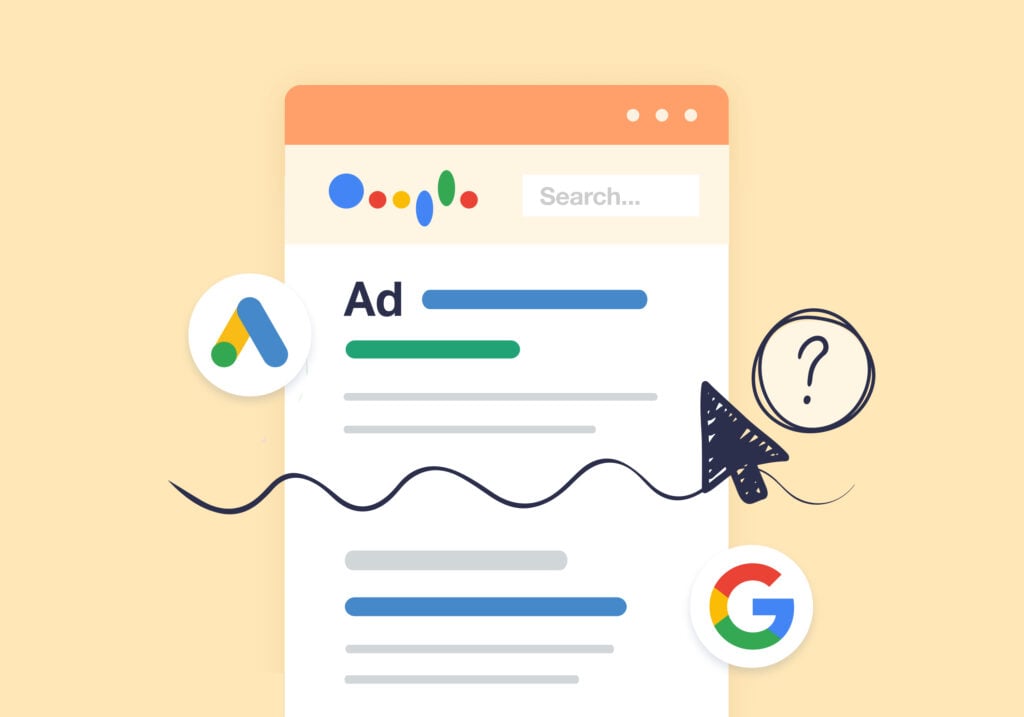
Despite all the performance metrics, data points, and quantitative measurements at our disposal, marketers are still left to answer some serious questions.
- What marketing channels generate the most qualified leads?
- Which keywords, campaigns, and landing pages delivered the highest ROI?
- Are these leads from new customers, or are existing customers clicking the ads to get a quote or make an appointment?
In a perfect scenario, we’d have all the information we need to answer these questions. And we could simply pick the perfect marketing method to use. But even still, there’s no one-size-fits all marketing channel.
Here at WhatConverts, we’re huge fans of PPC. And SEO is another one of our favorites. But the truth is, every marketing channel (PPC, SEO, email, etc.) has its own pros and cons. And each must be understood in order to be used most effectively.
That’s why today we’re breaking down the major benefits and challenges of the two most popular marketing channels—PPC and SEO.
PPC vs. SEO: The Pros & Cons of Each
First, let’s make sure we’re all on the same page: PPC refers to pay-per-click advertising and SEO is all about creating content that organically ranks higher on search results pages.
Now as you can see, PPC and SEO can be thought of as two sides of the same coin. Each is trying to bring in new leads. But each goes about doing so in a different way.
And because of those differences, there are some notable pros and cons to using each.
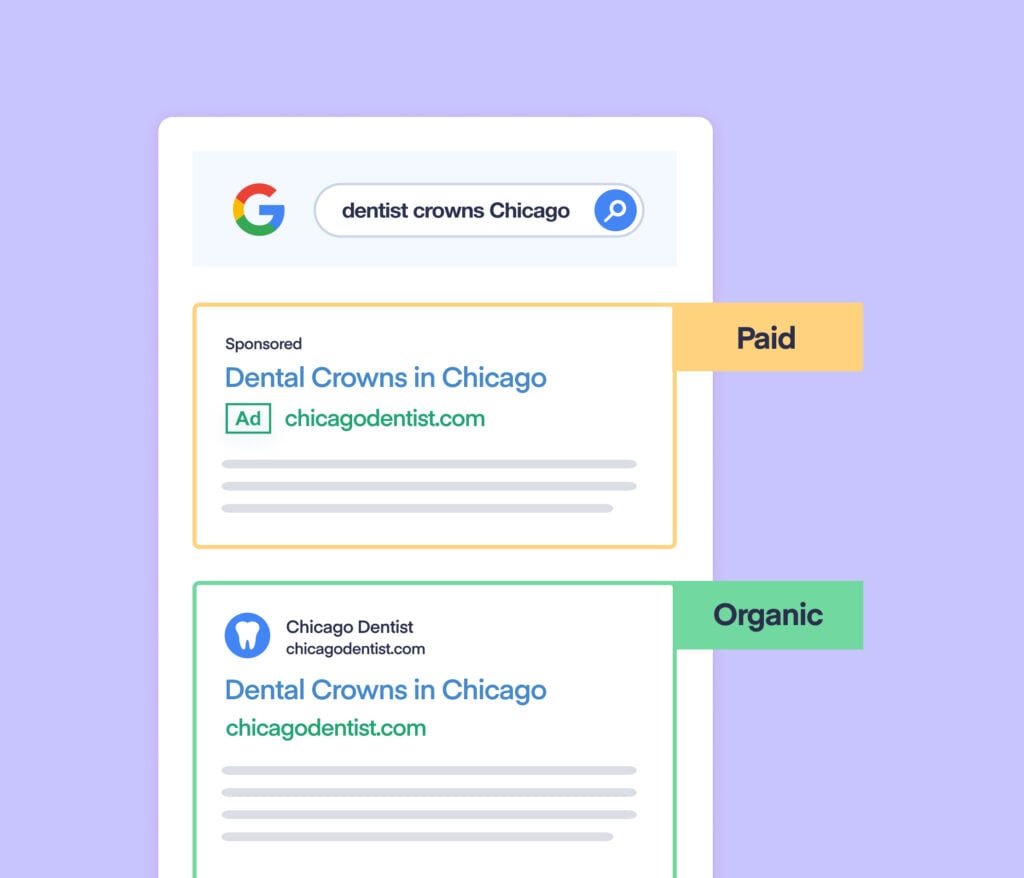
To get a better understanding of these differences though, let’s dive deeper by comparing PPC and SEO across eight major variables:
- Targeting
- Impact Speed
- Price
- Synergy
- Competition
- Impact Growth
- ROI
- Measurement
1. Targeting
If you’re looking for targeting power in your marketing campaigns, you can’t do much better than PPC.
PPC advertising gives you the ultimate measure of control over your advertising, both in terms of who you’re getting in front of and what you’re spending.
With PPC, you can target the following:
- Audiences based on marital status, education, homeownership, live events (relocation, retirement, graduation, etc.), and so much more.
- Location down to country, state, search area radius, and even zip code.
- Specific high-value high-intent keywords and how much you’re willing to bid on each.
- Certain behaviors like serving ads on other platforms to potential customers who have visited your site in the past (a.k.a. remarketing).
As you can see, PPC ads give you a lot of control over who sees your ads and when they see them. And that gives you tons of flexibility in how you achieve your marketing goals.
SEO on the other hand doesn’t offer anywhere near the same level of control.
Sure, you can incorporate strategic language to help you rank with certain keywords. And you can use content planners and keyword research tools to make your efforts even more successful.
But crafting content that targets specific audiences, locations, and behaviors is way more difficult—nowhere near as easy as with PPC.
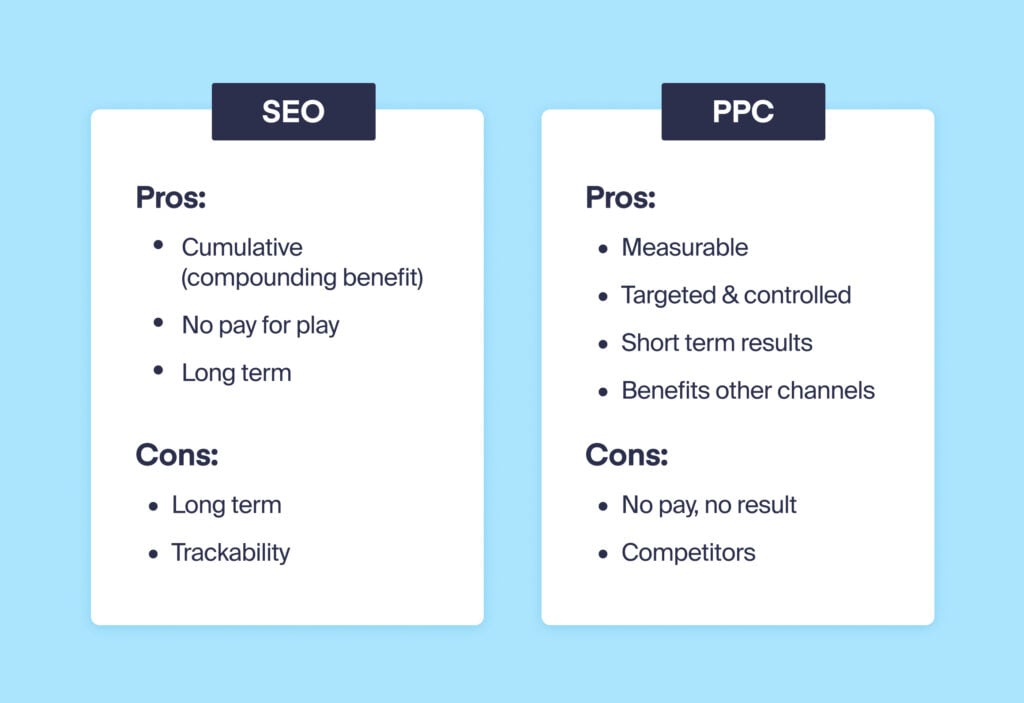
2. Impact Speed
When it comes to impact speed, PPC again is a winner.
Your ads get in front of the eyes of your target audience almost the instant you launch your campaign. And if your ads are strategic and hit your target market at the right point in their customer journey, you can see sales just as quickly.
With SEO though, seeing conversions from your content (even if it is well-made) takes time. It can take days, months, and even years before you see conversions come in.
What’s more, the high impact speed of PPC also lets you see the effects of your optimizations much more quickly.
For example, take a look at the yearly PPC sales value for a steel supplier client we worked with.
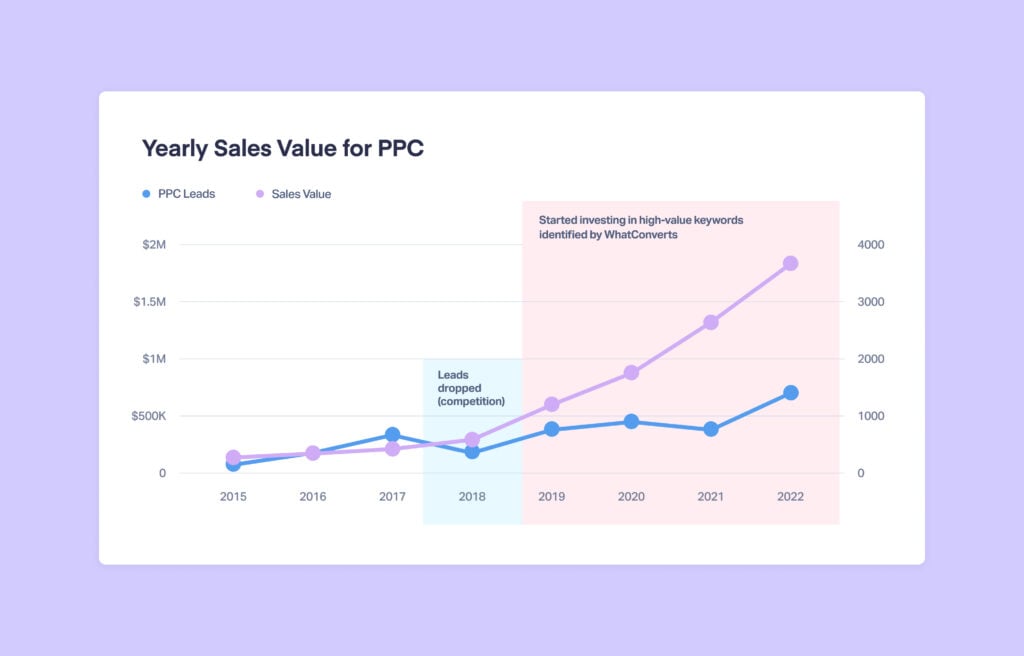
With this client, we were targeting about 1,500 keywords with their PPC campaigns. But when competitors came in around 2018, our leads started to drop. And that meant we had to pivot.
In addition to the 1,500 original target keywords, we also started investing more in 50 of the most high-value keywords on our list (which we could identify thanks to WhatConverts’ lead tracking). So rather than spending, say, $1 per click, we were bidding $5 per click on these high-value keywords.
And as you can see, the effect was almost immediate.
Our yearly sales value for PPC skyrocketed from under $500,000 in 2018 to nearly $2,000,000 in 2022.
The moral of the story is this—the quicker you can see results, the quicker you can keep iterating and improving. And PPC is great for that.
3. Price
Now, one area where SEO comes out ahead of PPC is price.
Like almost any form of advertising, PPC ads cost money. Simply put, you cannot benefit from a PPC campaign without the finances to fund it. And as the cost of ads on platforms like Google and Bing continue to rise, some marketers may find themselves asking, “Is it worth it?”
On top of that, your campaigns can only bring in results as long as you’re paying for them. You won’t get any ancillary benefits once your ads stop running.
Conversely, SEO content is relatively low-cost at the outset.
Sure, you’re paying for a writer and a designer to develop the content. But once the page is done, your costs are practically settled.
Added to that, SEO strategies continue to pay off by bringing in results long after they’re created. Here at WhatConverts, we’re still earning leads off of content we created way back in 2015.
A good way to think of the difference here is that PPC is like a service, and SEO is like a product. When you stop paying for a service, you no longer benefit from it. But when you buy a product, you get to hold on to all the benefits it provides.
4. Synergy
This is an interesting one.
A lot of marketers may not know it, but running PPC ads can actually benefit your SEO. Now, the benefits are mainly indirect. But a clever marketer will still know how to take advantage of them.
Three of the main SEO benefits you’ll see from PPC are:
- Leads may see your ads and click on organic links or directly type in the URL.
- You can use insights from your PPC campaigns to inform your SEO strategy.
- PPC ads boost brand awareness, take up on-page real estate, and can move leads through the buyer’s journey faster—even if they don’t click on your ad.
In fact, we just published a whole article about it and how you can take advantage of this synergy.
SEO, on the other hand, doesn’t have quite the same impact on PPC ads. Beyond boosting brand awareness (through great content) and using content insights to inform PPC campaigns, SEO just isn’t as beneficial to PPC.
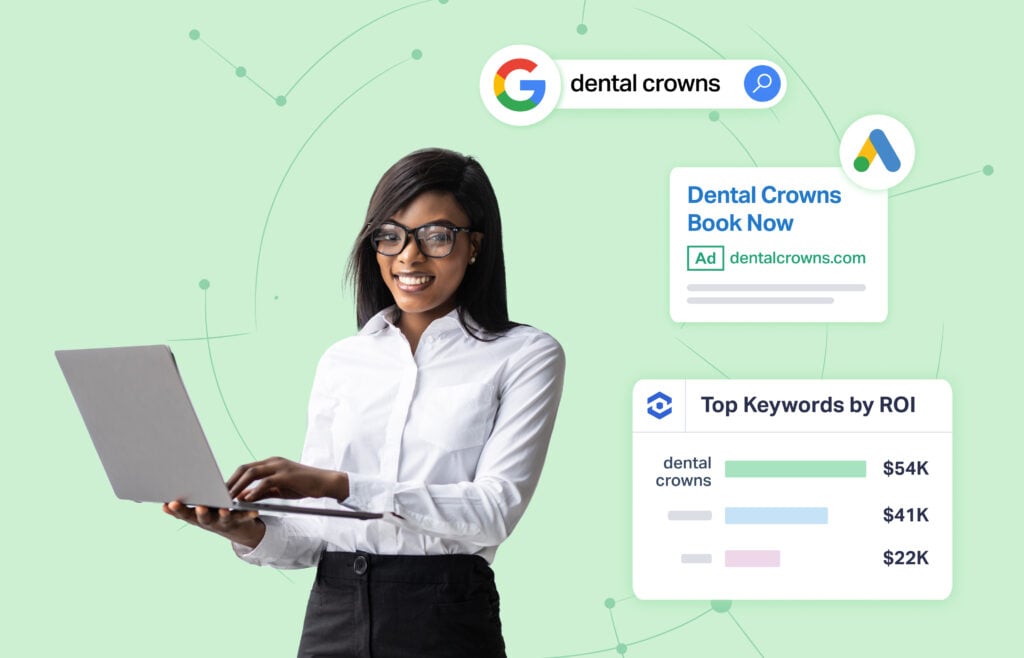
5. Competition
When it comes to PPC, there are a lot of factors you can control.
Factors like:
- Targeted Keywords
- Ad Copy
- Landing Page
- Cost per click (CPC) & Budget
But there are also a few things you can’t control.
The Google Algorithm is one. But there’s also:
- Competitor Budget
- Competitor Bids
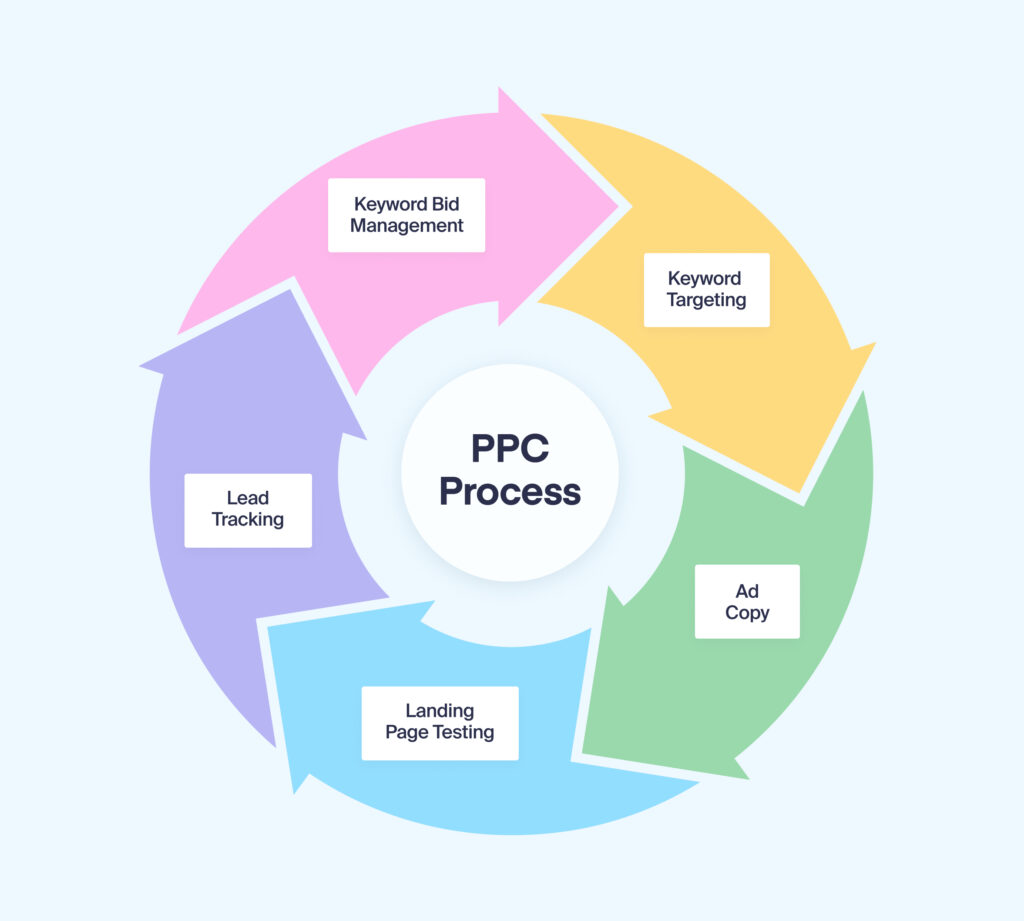
In fact, competition is one of PPC’s biggest weak points. Because once a competitor understands your strategy, they can make serious disruptions to your PPC success.
For example, remember that steel supplier client we mentioned earlier? Once a competitor entered their market, they were able to eat up a serious chunk of our client’s search ad impression share. And over the course of 8 years, our client’s impression share went from around 70% down to about 10%.
On top of that, they ended up paying substantially more just to stay in the market.
Have a look.
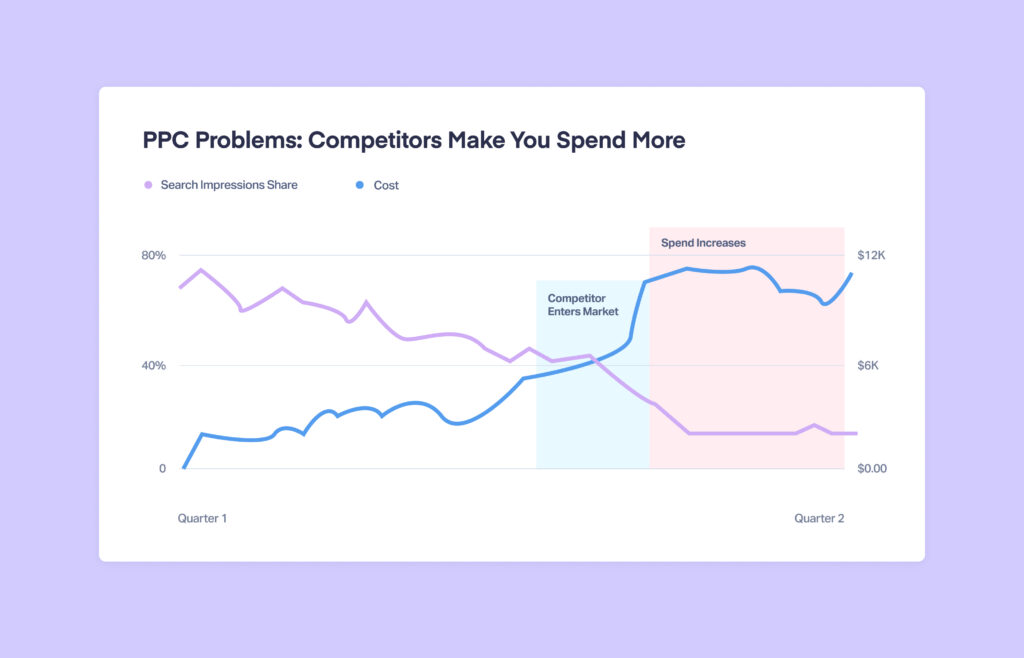
With PPC, competitors have a major impact on your costs. And that can make PPC untenable as a long-term marketing strategy.
So what about SEO?
Don’t be fooled here—competition is still stiff in the world of SEO. But the main benefit of SEO is that once you’re established in the organic results, your competition can’t simply buy you out (like with PPC).
Of course, they could displace you by creating better, more SEO-rich content. But that takes more time to accomplish. And that means SEO has the strategic competitive advantage here.
6. Compounding Growth
Another major benefit SEO has over PPC is that its impact is compounding.
Essentially, the more SEO-rich content you create (and the more consistently you create it), the more that content is going to build on itself. And over time, you’ll see the benefits of your SEO grow exponentially.
Let’s look at some of our own data here.
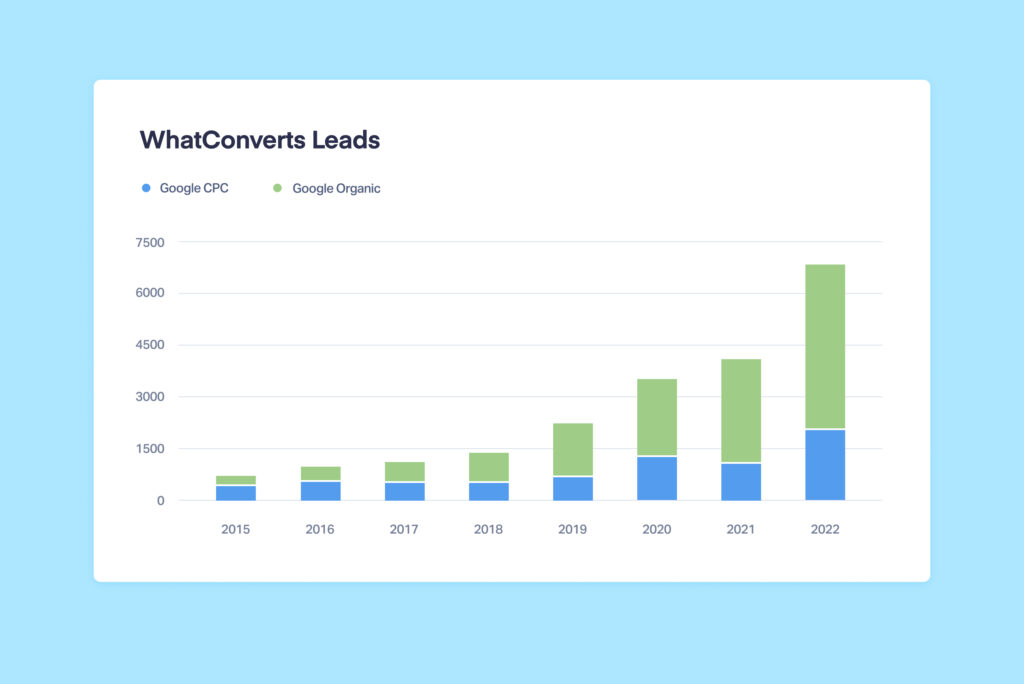
When WhatConverts first started out back in 2015, the majority of our leads came from PPC campaigns. And over the last seven years or so, we’ve increased our ad spend along the way.
As you can see, there has been a solid rise in PPC lead generation. But at some point, that rise plateaued. Though our spending was increasing, we didn’t see the same gains as before. It’s the Law of Diminishing Returns in action.
But what stands out most from this data is the growth in leads from our organic content. Year over year, we consistently saw more and more leads coming in from our content.Why?
Because SEO success builds on itself.
If your content is valuable, it will continue to convert for years to come (especially if it’s optimized for conversions).
PPC campaigns simply don’t have that kind of staying power.
7. ROI
Return on investment—that’s what marketing is all about.
Now to understand your ROI, you need to know a few key metrics like:
- Cost per lead
- Lead conversion rate
- Customer lifetime value
- Referral rate
- And many more
But ultimately, it all comes down to this…
Is the money you’re putting in paying off in terms of what’s coming out?
And when it comes to SEO vs. PPC, the ROI winner among the two is clear.
SEO wins out by a landslide.
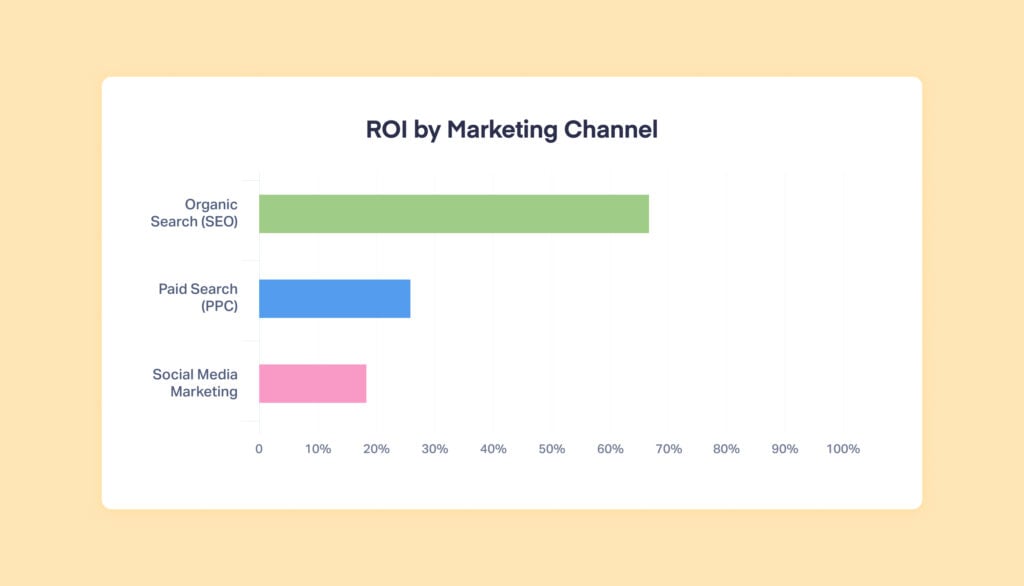
If you invest the time and resources it takes to create great SEO content, you’ll see a much stronger ROI than if you’d invested those resources in PPC alone.
And the marketing community is generally in agreement on this point.
Ahrefs, an SEO software suite, points out that if they were to buy the equivalent traffic of what they spent on content development (likely in the mid 6-figures per year), they’d have to have a monthly ad budget of $548,000 (or $6.5 million per year).
And don’t forget—SEO content keeps generating leads. PPC stops the second you shut your campaign down.
So when it comes to ROI, SEO is the clear winner.
8. Measurement
Over the long term, SEO efforts have a higher ROI than PPC. But the difficulty with SEO is that it’s tough to directly measure the marketing impact of a piece of content.
Why?
Because it can take a long time before that piece of content actually starts bringing in leads. And that can make measuring the value of your SEO efforts especially difficult.Beyond that, you can only really measure two things:
- What the medium was that brought leads in (usually organic search via Google or Bing)
- What the landing page was that they landed on
That’s it.
With PPC though, you’re getting a wide range of instant data about leads that convert through your ads.
For instance, with PPC you can clearly see data on what brought leads in, including:
- Keywords
- Ad copy
- Campaign
- Impressions
- Clicks
With that information, you can also calculate:
- Impression to click conversion rate
- Click to lead conversion rate
And with that data, you can quickly adjust your strategy to incorporate this new information. It’s actionable. And you don’t have to wait around for months to see what’s working and what isn’t.
It’s why most marketers report that PPC is the easiest channel to measure ROI.
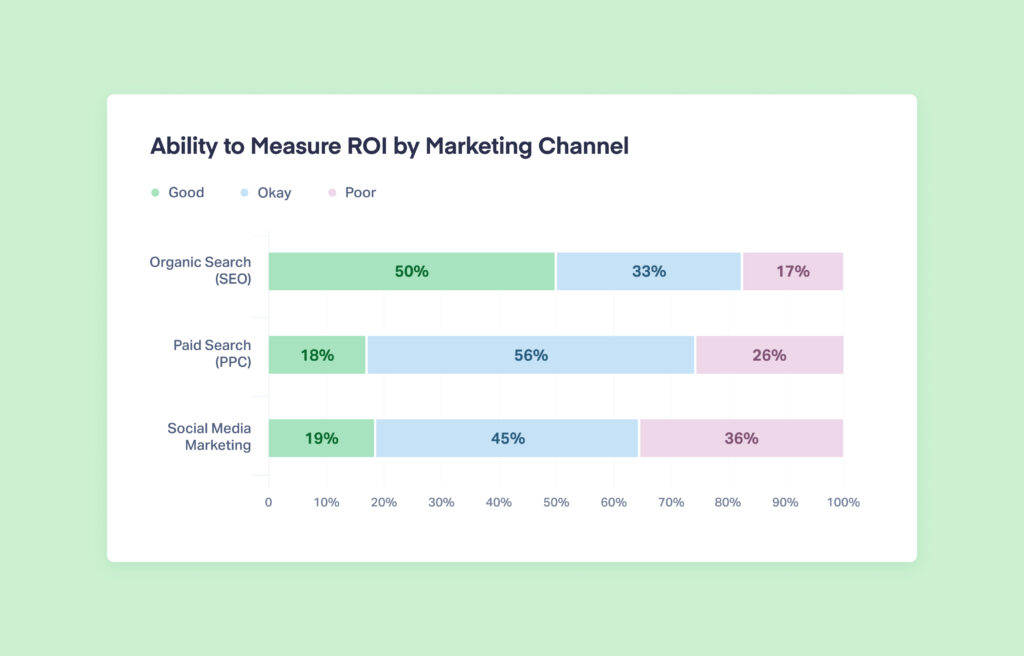
So as you can see, PPC has a major advantage over SEO when it comes to measurement—even though SEO has a greater ROI in the long run. It’s also more actionable.
That being said, things get really interesting when you’re able to more accurately measure leads that come from your SEO content marketing with lead-tracking software like WhatConverts.
When you can see which of your content marketing efforts is paying off with real, quantitative lead generation data, you can better demonstrate the value of your marketing efforts to your clients.
PPC vs. SEO: Pros & Cons to Both
At WhatConverts, we’re admittedly huge fans of PPC. The targeting, the tracking, the timing—it’s why we consider it one of the great wonders of the marketing world.
But we also know it—like any other marketing channel—has its challenges.
PPC may have better targeting, impact speed, synergy, and measurability. But SEO wins out on price, competition, impact growth, and ROI.
In the end, there’s a place in any marketing plan for both.
What’s important is that you have systems in place to track the effectiveness of all your marketing channels. You already know what you’re spending your marketing. And WhatConverts helps you know what you’re making from each marketing channel—from SEO and PPC to phone calls, online chats, and forms.
Because that’s the only way both you and your clients will truly understand the value of your marketing efforts.
Get a 14-day free trial of WhatConverts to see what lead-tracking software for marketing can do for you!
Get a FREE presentation of WhatConverts
One of our marketing experts will give you a full presentation of how WhatConverts can help you grow your business.
Schedule a Demo
Grow your business with WhatConverts





